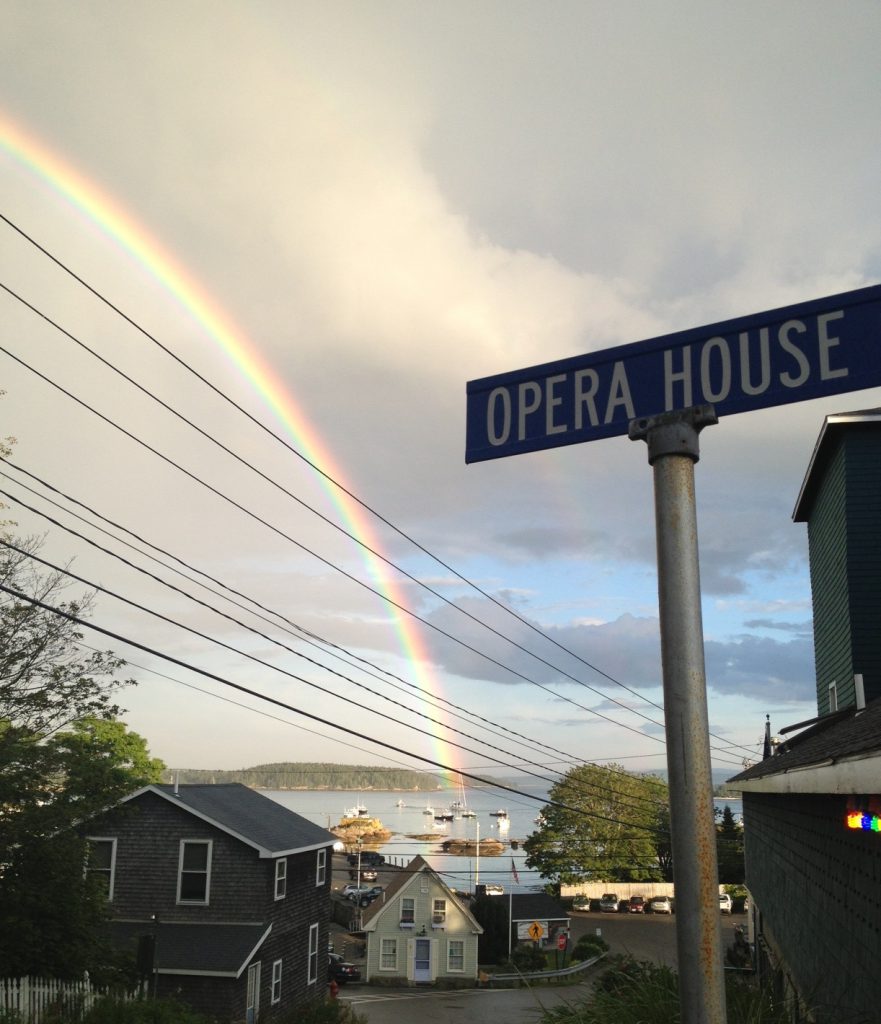
Maine Attraction
By Larry Blumenfeld
“Condoms. Tampons. Excess hair. SMALL AN-I-MALS!”
So sang the dozen folks forming a circle within a tiny cabin last July, holding that last syllable until Arturo O’Farrill dropped his right hand with a conductor’s authority. I’d just made the nine-hour drive from Brooklyn, New York, to Deer Isle, Maine, but my bleary eyes found strength to widen. I laughed.
I’d walked in on a rehearsal for Haystack, The Opera: An Afro-Cuban Jazz Odyssey— and it was no joke. O’Farrill’s wife, Alison, sat at a keyboard, his eldest son, Zack, before a set of conga drums. His youngest, Adam, held a trumpet, awaiting his cue. Soon various rhythm instruments — hand drums, cowbells, guiros, clavés — were handed out.
Before long, O’Farrill had these painters and potters and sculptors, all of whom had come to the Haystack Mountain School of Crafts for a summer session, creating four layers of rhythm and sounding pretty damn in-sync.
O’Farrill had come to Maine to headline at the annual Deer Isle Jazz Festival, for which I’ve been curator since its inception, in 2001. Each summer, one festival musician serves as artist-in-residence at the Haystack School. O’Farrill, a celebrated pianist and bandleader, the son of a legendary Cuban composer, met this challenge by bringing his whole family and creating an opera, with lyrics drawn from Haystack Director Stuart Kestenbaum’s work — not his celebrated poetry, but his school manual, the part about “what not to flush down the toilet.”
I’d grown accustomed to such odd surprises. This unexpected turn in my own career stemmed from, well, an unexpected turn. A decade ago, my wife, Erica, and I were driving around Stonington, Deer Isle’s southernmost town, tracing curve after curve, gawking at cove upon cove, when one right left us facing a dilapidated circa-1912 opera house bearing a “For Sale” sign. I mumbled something about quitting our jobs and selling our co-op. “We could turn it into a nonprofit arts center,” I said, to which Erica flashed a look that’s come to mean something between “My, that’s a fascinating idea” and “Shut up already.”
It was, and I did. A year later, four women bought the place, cleared out the dead raccoons, and renovated. The Stonington Opera House — at various points, a dance hall, vaudeville theater, and high-school basketball arena — was now home to the nonprofit Opera House Arts. I introduced myself. Linda Nelson, the indefatigable executive director, suggested we mount a jazz festival. Artistic Director Judith Jerome talked with me about improvisation in all its forms. We sat until sunset, when the island sky turned blue and pink and cast eerie reflections on the water that changed with each passing moment. Whitney Balliett famously called jazz the “sound of surprise,” I thought, but this place looked the part.
We were off. There were jazz fans hidden in the hills, literally. Several opened their homes to visiting musicians and didn’t stop there; they baked blueberry muffins, demonstrated lobster bisque recipes, loaned Subarus. Saxophonist Dewey Redman, our first headliner, sent yearly Christmas cards to his hosts. I recall indelible images: Romero Lubambo sitting on a porch after breakfast, strumming his guitar as Luciana Souza slapped soft percussion on her thighs and sang bossa novas into the morning mist; William Parker’s band members dotting the sloping hill near Lindsay Bowker’s stately house, grinning giddily as they carried bright-red lobsters in varying stages of dismemberment; Greg Osby and his wife heading off to Nervous Nellie’s Jams and Jellies.
There were silly, touching moments (Jason Moran lifting his pant leg onstage and thanking his host, Stan Bergen, for the dress-sock loaner), and scary stretches (driving from the Bangor airport through pounding sleet and blinding fog with Randy Weston cramped into my Saab, praying not to be scripting his bio’s final line).
I’d come to Deer Isle 10 years ago to be refreshed. Yet even more invigorating then the brisk air and chilly water was the attitude of these audiences. The morning after Parker’s 2004 concert, I asked Perry Hunter, who had offered to drive the band to the airport, whether the music sounded too “avant-garde.”
“Only an old man would say that,” he shot back. With that, the 75-year-old slammed the van door shut and drove off. I felt transported.
